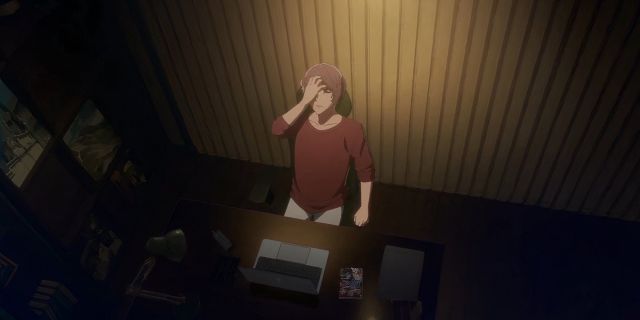Highlights
- Making adaptations is complex – intentions can result in misunderstandings; communication is key.
- Lack of clear communication led to a script overhaul request, causing tension in production.
- Criticism and blame can lead to fallout – proper communication is crucial to avoid misunderstandings.
The following contains spoilers for Episode 2 of Oshi no Ko, “The Telephone Game,” now streaming on HiDive.
The mangaka of Tokyo Blade, Abiko Samejima, has come to see the rehearsals for the upcoming stage play adaptation, and unfortunately, she’s got quite a bone to pick. Unfortunately, her lack of tact and overwhelming passion for her work turns what could have been a simple conversation into a shouting rant, and the entire stage play itself might be threatened.
The newest episode of Oshi no Ko looks deeply into the world of making adaptations, and how even the best of intentions can cause a huge disconnect in how people can communicate with each other. Making adaptations can be incredibly complicated, and there’s no right answer to how to make one successfully. While many may try to play the blame game, the point where adaptations can go wrong is not so easily pinpointed.
Before The Fallout
Abiko Samejima’s Odd Personality

After dropping her bombshell of a request, time rewinds back to the beginning of the Tokyo Blade project, where Aqua, Kana, and Melt meet up with the actors of Lala Lai for the first time. Melt has lost his arrogance from his time on Sweet Today, though he has gained the passion to become a better actor. Meanwhile, Kana is incensed by Aqua and Akane’s relationship, though she tries her best to pretend otherwise. Once everyone is introduced to each other, the actors begin preparing for rehearsal.
Elsewhere, Abiko and Yoriko Kichijoji go out for drinks. After spending some time talking about Abiko’s success and career, Abiko asks Kichijoji to accompany her to watch the upcoming rehearsals. As they prepare to leave for a different place, Abiko excuses herself to brush her teeth. While waiting for her, Kichijoji dwells on Abiko’s withdrawn personality, and how it might cause problems when it comes to this particular adaptation. Her premonitions end up coming true, with Abiko’s request throwing the production into disarray.
Frustration And Irritation
A Cathartic Yet Undeserved Scolding

The production are stunned to hear that Abiko wants the entire script for the stage play adaptation overhauled, especially considering she’d already given them the okay. Abiko explains that she’d already demanded many changes, and only gave the okay because she was told she’d be on board once she watched the rehearsal, but since that wasn’t the case, she insists on her revisions. GOA, the scriptwriter, apologizes for her misgivings with the script, but swore that he wrote the script while best considering her requests and the demands a stage play needs.
Abiko, now knowing the man behind the script, demands to know how he could possibly have written such a script. She first accuses him of never having read the manga, and then insists that his work is completely disrespectful to the characters she created. Before she has the chance to say something she can’t take back, Kichijoji and her editor quickly drag Abiko away, and rehearsals are unceremoniously canceled for the day.
Fallout
The Unseen Victim

Abiko is pulled into a separate room where she airs out her grievances to the producer, Sumiaki Raida, and her editor. Meanwhile, Kichijoji, GOA, and Aqua wait outside uneasily watching things unfold. As they do, Kichijoji explains the usual workflow behind an adaptation, and theorizes how this huge difference in communication occurred. Once the first draft of the script was handed to Abiko, Kichijoji believed Abiko already had issues with it. However, due to her struggles to communicate herself clearly, and the sequence of mediators the message had to go through before reaching GOA, none of her real complaints ever managed to get to the scriptwriter.
While Abiko’s outburst may seem unwarranted and childish, in truth it is the result of having her requests and feelings ignored time and time again. Having said that, it’s clear that Abiko is wrong to place the entirety of the blame on GOA, especially when he tried his best to abide by the author’s wishes. Nevertheless, Abiko insists on rewriting the entire script herself, despite the lack of time and her unfamiliarity with the medium. Under threat of having her permission to have the play at all revoked, Raida and her editor capitulate to her demands.
Finally, Abiko insists that GOA be removed from the project, though his credit may remain. Aqua asks GOA if he plans to do anything, but there’s little that he can do as a scriptwriter. All he can do is accept being the fall guy, if it means the play can go on without any issues. Despite all this, he can’t help but feel discouraged after being criticized so heavily, even though his love for the work and the art of scriptwriting is genuine.
In the meantime, rehearsals are canceled until the new script is completed. As the actors discuss what they’ll do with so little time to rehearse, Aqua hears Akane mention Stage Around and wonders what it means. Akane, shocked that Aqua knows and cares so little about the theater, decides to take him to a showing, believing that he’ll be surprised at what theater productions have to offer.











Leave a Reply